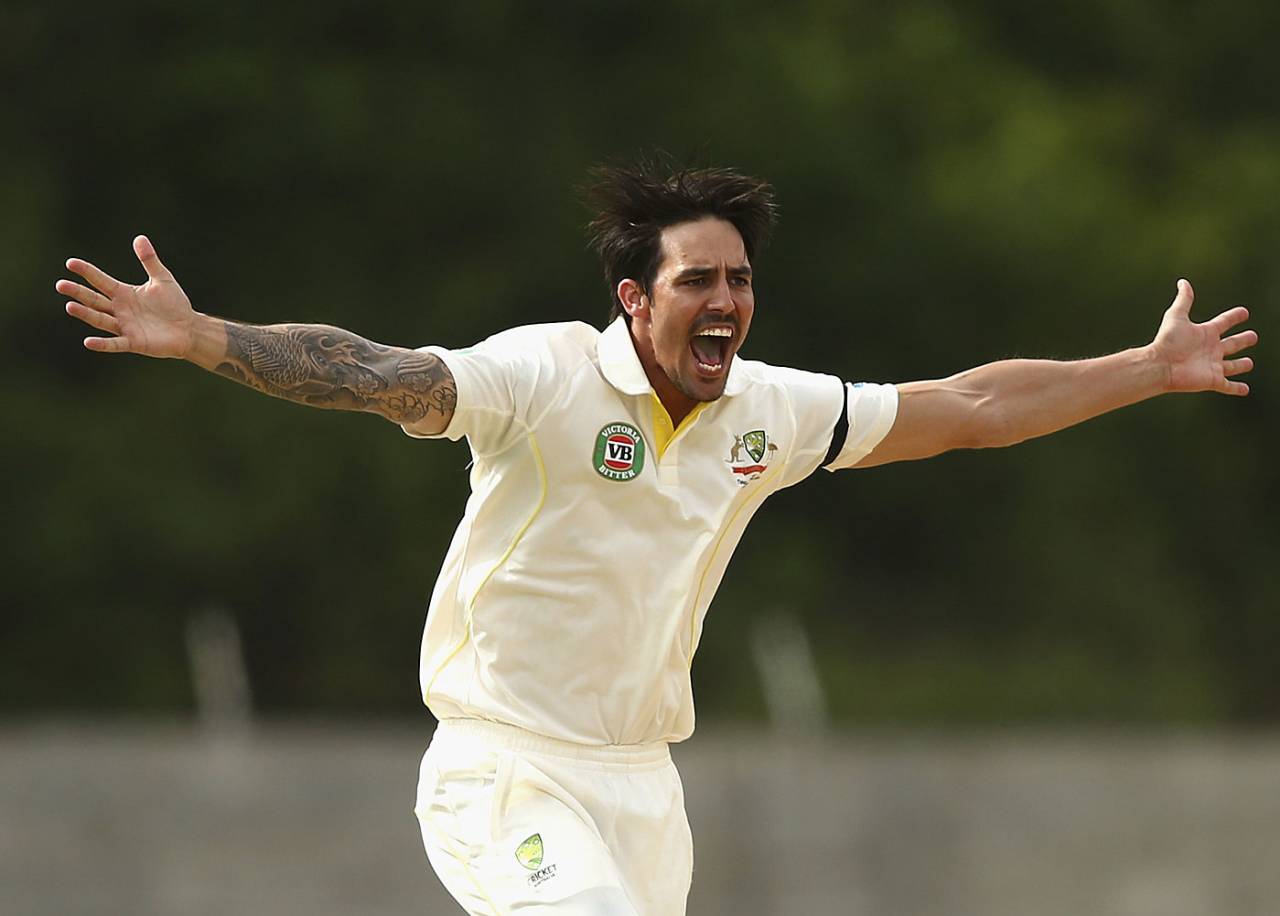Pace is gonna get you
Despite England's recent surge, Australia will likely prevail in the Ashes thanks to their lethal pace attack, which is suited to all types of pitches
Ian Chappell
28-Jun-2015

"If Johnson don't get ya, the others must" • Getty Images
"Ashes to ashes, dust to dust; if Thommo don't get ya, then Lillee must."
That witty ditty first appeared during the 1974-75 series, but it also serves as a succinct reminder of Ashes history - a tale of terrific, and at times terrifying, fast bowling. It's a history littered with occasional broken bones and animosity, and highlighted by the colourful nicknames attached to speedsters who dictated the fate of series. It all began with Fred "The Demon" Spofforth and has continued with Harold Larwood, known as the "Notts Express", Ray "Killer" Lindwall, Frank "Typhoon" Tyson, and Jeff "Terror" Thomson and his co-conspirator Dennis "The Menace" Lillee.
The trend of pace domination surfaced again in the last Ashes series, when Mitchell Johnson - yet to acquire a threatening epithet - shattered England's will with a withering burst of pace and steep bounce. Thanks to Johnson, Australia was able to turn a 3-0 deficit in 2013 into a 5-0 surplus in early 2014. A stunning turnaround in fortunes that has every country's treasurer drooling.
While Johnson's pace was the catalyst for Australia's quick rebound, he was complemented by a strong supporting attack and an astute tactical captain.
On the early evidence, Johnson's confidence in his own ability has risen to a point where he could create similar mayhem again, even on the less bouncy English surfaces. Even if he can't, Australia are still well-placed with the likes of Ryan Harris, Mitchell Starc and Josh Hazlewood, who while all lively in pace, also offer movement both off the seam and through the air. Despite Steven Smith's mercury-like rise to the top of the rankings, Australia's batting is vulnerable. Nevertheless, there's less pressure on a batting line-up when the team's bowlers keep the opposition tally to a manageable level.

The current England team can take the game by the scruff of the neck thanks to an aggressive middle order•Getty Images
England's chances in the series have improved in the last few weeks and it has nothing to do with a spate of off-field appointments. England are suddenly playing a much livelier brand of cricket, and the best way to beat a strong opponent like Australia is to attack them judiciously.
In fact it's the one non-appointment made by England that may well hamper their pursuit of the urn. Despite the many changes to personnel in the English hierarchy, Alastair Cook remains captain, and he's not proactive enough to ensure this team fulfils its undoubted potential. When choosing a captain, selectors must take into account the nature of the team. Are they a dour bunch of fighters who will wear the opposition down or are they an aggressive group whose best option is to attack at every opportunity?
Andrew Strauss was an appropriate leader for a team that contained a few stars but mostly good, hard-working cricketers. That's not the type of side England are now. The current team has the potential to take the game by the scruff of the neck thanks to an aggressive middle order; eventually a vibrant cricketer like Joe Root may be the leader who brings out the best in this team. It will help Root's cause when he ultimately takes over, if England have by then unearthed a genuine speedster to spearhead the attack.
Despite England's attack being a good one, they are outpaced by Australia's fast men, and it would be interesting to listen in on the instructions issued to the groundsmen. England are quick to condemn others but they are high on the most-wanted list when it comes to countries that prepare pitches that suit the home side.
"When in doubt say nothing and then complain afterwards if it all goes awry" may well be the prevailing wisdom.
Hopefully the pitches will provide an even contest between bat and ball and the skill of the players will decide what increasingly looms as an absorbing contest. If that's the case, recent history suggests that despite England's changed attitude, Australia will still prevail.
"Ashes to ashes, dust to dust; if Johnson don't get ya, then others must."
Former Australia captain Ian Chappell is now a cricket commentator for Channel 9, and a columnist